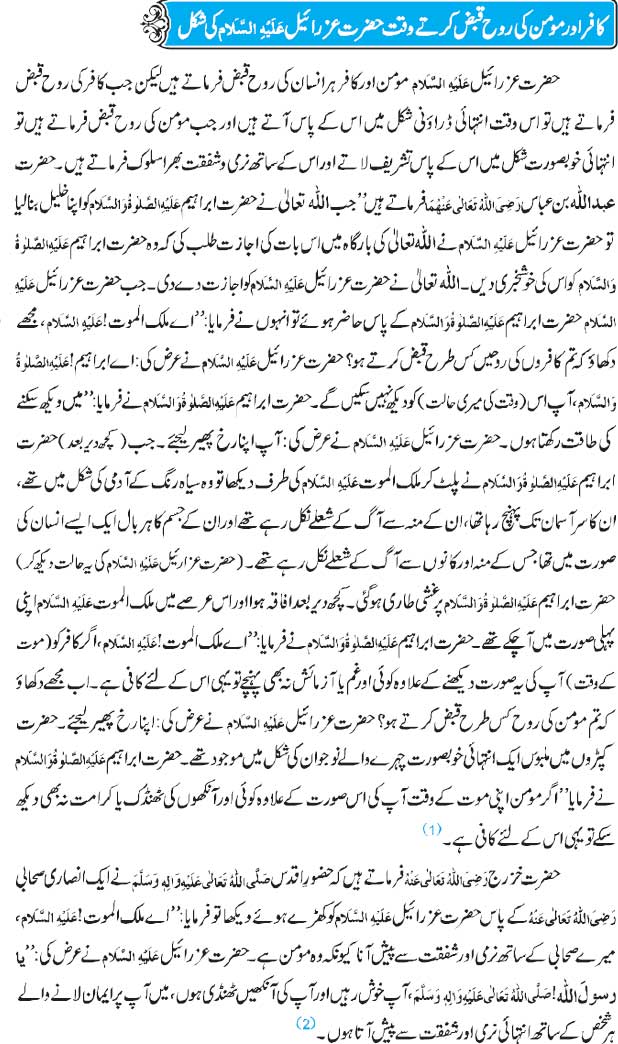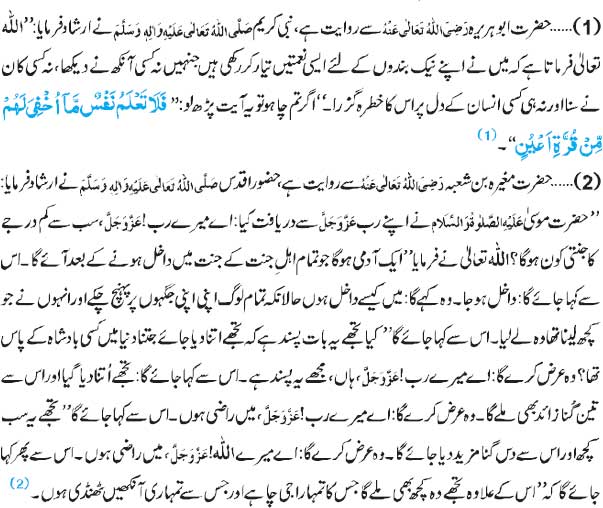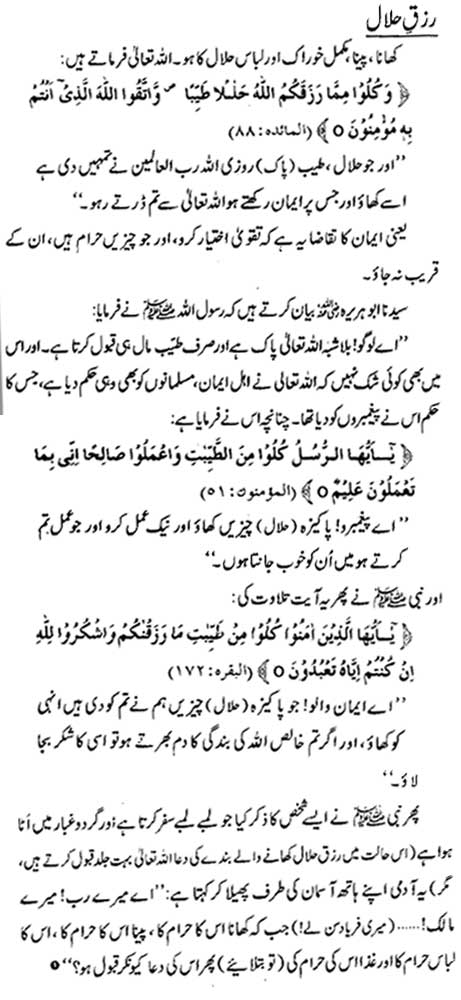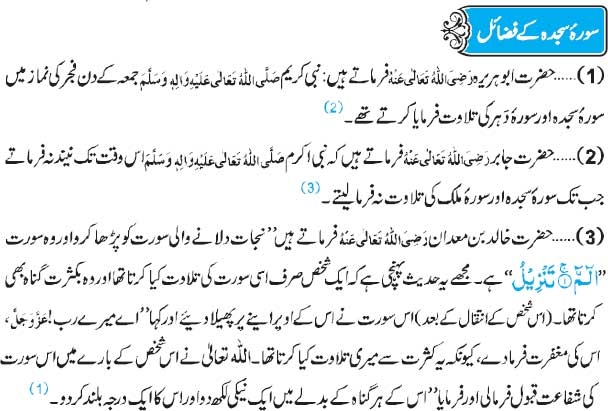
Rooh Qabz Karte Waqt Hazrat Izraeel AS Ki Shakal


[ALLAH’S Quran – 2:193] “And fight them on until there is no more Tumult or oppression, and there prevail justice and faith in Allah; but if they cease, Let there be no hostility except to those who practice oppression.”
The Prophet (Peace Be Upon Him) has said :
[Muslim, Book #032, Hadith #6247 ] “Abu Dharr reported Allah’s Messenger (may peace be upon him) as saying that he reported it from his Lord, the Exalted and Glorious: Verily I have made oppression unlawful for Me and for My servants too, so do not commit oppression.”
[Muslim, Book #032, Hadith #6248 ] “Jabir b. Abdullah reported that Allah’s Messenger (may peace be upon him) said: Be on your guard against committing oppression, for oppression is a darkness on the Day of Resurrection, and be on your guard against petty mindedness for petty mindedness destroyed those who were before you, as it incited them to shed blood and make lawful what was unlawful for them.”
[Muslim, Book #032, Hadith#6250] “Salim reported on the authority of his father that Allah’s Messenger (may peace be upon him) said: A Muslim is the brother of a fellow-Muslim. He should neither commit oppression upon him nor ruin him, and he who meets the need of a brother, Allah would meet big needs, and he who relieved a Muslim from hardship Allah would relieve him from the hardships to which he would be put on the Day of Resurrection, and he who did not expose (the follies of a Muslim) Allah would conceal his follies on the Day of Resurrection.”
[Sunnan Abudawud, Book #41, Hadith #4884] “Narrated Abu Bakrah: The Prophet (peace_be_upon_him) said: There is no sin more fitted to have punishment meted out by Allah to its perpetrator in advance in this world along with what He stores up for him in the next world than oppression and severing ties of relationship.”

The punishment for a sin committed by a believer is removed in ten ways:
1. He repents to Allah (taubah), so Allah accepts his repentance, for the one who repents from sin is like the one who has no sin.
2. He seeks forgiveness from Allah (istighfar), so Allah forgives him.
3. He does good deeds that erase his sin for good deeds erase bad ones.
4. His believing brethren pray for him or seek forgiveness for his sins during his life or death.
5. Or they [ask Allah] to bestow on him as gift from the reward for their deeds, with which Allah benefits him.
6. His Prophet Muhammad, sallallahu `alayhi wa sallam, intercedes for him.
7. Allah tests him with trials in this world which expiate his sin.
8. Allah tests him in al-Barzakh (the intermediate life in the grave, between the death and the Day of Judgment) which expiates his sin.
9. Allah tests him in the various stages of the Day of Judgment which expiates his sins.
10. Or the Most Merciful of those who have mercy has mercy on him.
Whoever, then, is missed by these ten cannot blame anyone but himself.

Love and hate are among the actions of the heart. It is obligatory upon the pubescent person to use these two emotions in accordance with the rules of the Religion. One must love Allah and what is in accordance with the rules of Islam. Also, one must hate the devil and what he whispers of sinful matters.
1. Loving Allah and His Messenger, sallallahu Alayhi wa sallam: The pubescent person is obligated to love Allah, His Quran, and His Prophet. This is done by following the orders of Islam and avoiding its unlawful matters.
Allah, ta’ala said:
Ayah 31 of Suratu Al ‘Imran means: (Say, O Muhammad, If you love Allah, then follow me, and Allah will love you)
This is an essential part of believing in Allah, what He revealed, and believing in the Prophet and what he brought. The doubt in Allah, on the other hand, His Quran, or His Messenger is among the sins of the heart. In fact it is blasphemy, which takes one out of the Religion of Islam.
2. Loving the companions, relatives (Al) of the Prophet, and the pious Muslims: Among the obligations of the heart is loving the Companions, relatives (Al) of the Prophet, and the pious Muslims. Failing to love them is one of the sins of the heart. Mocking or cursing them is among the sins of the tongue.
The Companions: They are the Companions of the Prophet. They supported the Religion of Allah and spread it, especially the earlier ones who immigrated with the Prophet, sallallahu Alayhi wa sallam, and those who received him in Madinah. The Companions are the people who met the Prophet during his life and believed in him, whether they knew him for a long or a short time, as long as they died on the correct belief.
The Relatives (Al) of the Prophet: This term is given to the wives of the Prophet such as Khadijah and Aishah. It also refers to his Muslim relatives, like Hamzah, al-Abbas, Aliyy, al-Hasan, al-Husayn, and their mother Fatimah (may Allah raise all their ranks).
Loving the Al of the Prophet is an obligation because of the merit they have. If one means by the term Al the God-fearing pious people, which is one of its meanings, then loving them is an obligation, because they are beloved to Allah due to their ideal behavior in obeying Allah.
The Pious Muslims: They are the ones who have performed all the obligations and avoided all the sins. Among these categories are the scholars, and the highly righteous Muslims.
3. Hating the Devil and Sins: Among what is also obligatory on the heart is hating the devil and the sins. Also, one must regret performing the sins.
We ask Allah to strengthen our love to Allah and His Prophet and increase as we live.
Allah knows best

{Invite (mankind, O Muhammad ) to the Way of your Lord (i.e. Islam) with wisdom (i.e. with the Divine Inspiration and the Qur’an) and fair preaching, and argue with them in a way that is better. Truly, your Lord knows best who has gone astray from His Path, and He is the Best Aware of those who are guided.}
(Holy Quran-16:125)
{And who is better in speech than he who [says: “My Lord is Allah (believes in His Oneness),” and then stands straight (acts upon His Order), and] invites (men) to Allah’s (Islamic Monotheism), and does righteous deeds, and says: “I am one of the Muslims.”} (Holy Quran-41:33)
The prophet (peace and blessings of Allah be upon him) said: “By Allah, if Allah guides one person by you, it is better for you than the best types of camels.” [al-Bukhaaree, Muslim]
The prophet (peace and blessings of Allah be upon him) also said, “Whoever calls to guidance will have a reward similar to the reward of the one who follows him, without the reward of either of them being lessened at all.”
[Muslim, Ahmad, Aboo Daawood, an-Nasaa’ee, at-Tirmidhee, Ibn Maajah]

That black magic exists, there is no doubt. It is mentioned in the Qur’an. But magic has no real substance. It is all illusory; it has no substance. If you look at the references to magic which occur in the Qur’an, you will find that the sorcerers employed by Pharaoh to try to defeat Moses were able to produce “great magic”, that sent a feeling of fear into Moses, despite the fact that he was a messenger of God. Yet that great magic had no substance. God says: “Their ropes and staffs seemed to him to be moving, as a result of their magic.” This shows that they did not move, but he imagined them to be moving.
Could magic have a bad effect on us? Yes, it could, but I do not know how. There may be some evil people who resort to magic in order to disturb others. They may use their evil learning to earn money. They commit a grave sin. It is forbidden to learn magic and to practice it in any way. If a person resorts to such people asking them for help against a third party, both the one asking for that and the one doing it are guilty of disobedience to God.
How to counteract such evil deeds? It is by resorting to the Qur’an, reading it as often as one can, particularly the last two surahs: Al-Falaq and Al-Nas. One should also appeal to God for protection against all evil. When you have done that, try hard to keep all thoughts of people having cast a spell on you out of your mind. Always maintain that no harm could come to you without God’s permission. Therefore, do all that ensures for you God’s protection, fulfilling your duties, helping other people, particularly those in need. Always place your trust in God, reassuring yourself that no harm or benefit comes from people unless God wills it. He does not will anyone any harm.
